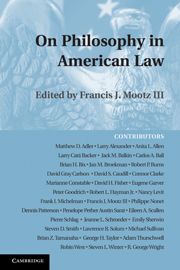Book contents
- Frontmatter
- Contents
- Introduction
- PART I KARL LLEWELLYN AND THE COURSE OF PHILOSOPHY IN AMERICAN LAW
- PART II PHILOSOPHICAL PERSPECTIVES ON LAW
- PART III AREAS OF PHILOSOPHY AND THEIR RELATIONSHIP TO LAW
- PART IV PHILOSOPHICAL EXAMINATIONS OF LEGAL ISSUES
- PART V LAW, RHETORIC, AND PRACTICE THEORY
- 23 Foundationalism and Ground Truth in American Legal Philosophy: Classical Rhetoric, Realism, and Pragmatism
- 24 The Irrelevance of Contemporary Academic Philosophy for Law: Recovering the Rhetorical Tradition
- 25 Dicta
- 26 Recent and Future Concepts of Law: From Conceptual Analysis to a Practice Theory of Law
- 27 The Tasks of a Philosophy of Law
- PART VI QUESTIONING THE RELATIONSHIP BETWEEN PHILOSOPHY AND AMERICAN LAW
- PART VII COMMENTARIES
- Contributors and Selected Bibliography
- Name Index
- References
27 - The Tasks of a Philosophy of Law
Published online by Cambridge University Press: 31 July 2009
- Frontmatter
- Contents
- Introduction
- PART I KARL LLEWELLYN AND THE COURSE OF PHILOSOPHY IN AMERICAN LAW
- PART II PHILOSOPHICAL PERSPECTIVES ON LAW
- PART III AREAS OF PHILOSOPHY AND THEIR RELATIONSHIP TO LAW
- PART IV PHILOSOPHICAL EXAMINATIONS OF LEGAL ISSUES
- PART V LAW, RHETORIC, AND PRACTICE THEORY
- 23 Foundationalism and Ground Truth in American Legal Philosophy: Classical Rhetoric, Realism, and Pragmatism
- 24 The Irrelevance of Contemporary Academic Philosophy for Law: Recovering the Rhetorical Tradition
- 25 Dicta
- 26 Recent and Future Concepts of Law: From Conceptual Analysis to a Practice Theory of Law
- 27 The Tasks of a Philosophy of Law
- PART VI QUESTIONING THE RELATIONSHIP BETWEEN PHILOSOPHY AND AMERICAN LAW
- PART VII COMMENTARIES
- Contributors and Selected Bibliography
- Name Index
- References
Summary
Out of the conjunction of activities and men around the law-jobs there arise the crafts of law and so the craftsmen. Advocacy, counseling, judging, lawmaking, administering – these are major groupings of the law-crafts. … At the present juncture, the fresh study of these crafts and of the manner of their best doing is one of the major needs of jurisprudence.
(Llewellyn 1941: 188)A principal task of a philosophy of law at this time is to provide a constructive account of legal practices that reveals how and when they achieve valid results. An adequate philosophy of law will thus understand the law as much more than legal doctrine, the law of rules. Such a philosophy will bring a radical empiricism to bear on the actual practices in which lawyers engage while interviewing, counseling, engaging in pretrial practices, mediating, trying cases, writing briefs, and arguing appeals, and in which judges engage in deciding their cases and justifying their decisions. It will rely on thick description and linguistic phenomenology. It will seek to identify how the best of those practices persuades their audiences of what true law in particular cases really is.
Thus the line between philosophy and legal anthropology will blur. This is something that Clifford Geertz (2000) has already seen occurring in the various forms of phenomenology and pragmatism that have characterized twentieth-century philosophy.
- Type
- Chapter
- Information
- On Philosophy in American Law , pp. 232 - 238Publisher: Cambridge University PressPrint publication year: 2009



